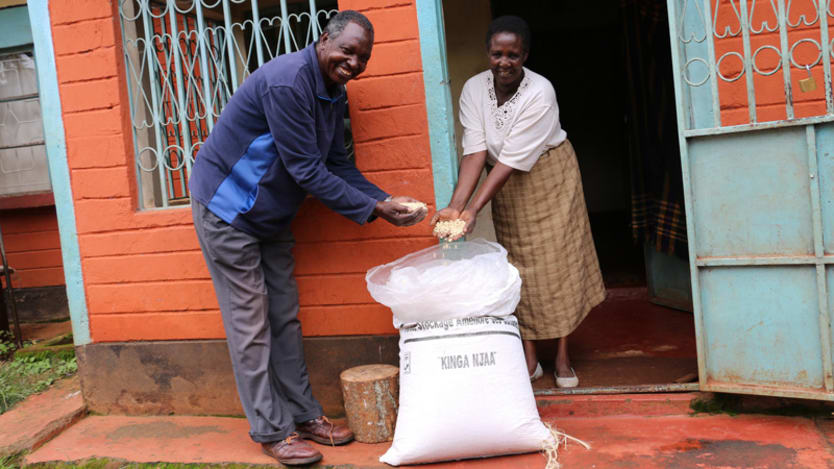
NAIROBI — Confusion surrounding Kenya’s new ban on plastic bags may jeopardize the agricultural sector’s use of a productivity-boosting innovation first introduced by the U.S. Agency for International Development.
Tens of thousands of farmers in Kenya rely on Hermetic Storage Technology (HST) agricultural bags to store their crops after harvest, keeping them safe from pests and decomposition to reduce food waste. USAID contributed about $150,000 to the promotion of these bags beginning in 2013, as part of its Kenya Agricultural Value Chain Enterprises (KAVES) project.
Kenya’s plastic bag ban applies to “all plastic carrier bags and flat bags used for commercial and household packaging.” The National Environment Management Authority (NEMA) of Kenya told Devex that the HST bags are considered exempt under the ban, but that companies that manufacture HST agricultural bags will still need to individually apply to NEMA for an annual clearance from the ban, in order to produce them.
Fifteen years in the making, the ban outlaws the use, manufacture, or importation of plastic bags with severe penalties, fines of up to $38,800 and up to four years in jail. It is intended to eliminate the waste associated with the estimated 100 million plastic bags that are handed out each year in Kenyan supermarkets alone. The bags block sewers and water drains, causing flooding in the rainy season, killing animals that consume them, putting toxins in the air when they are burnt, and affecting soil quality, because of their inability to decompose, according to NEMA.
NEMA is using its environmental inspectors to enforce the ban. They are tasked with inspecting retail shops, among other facilities that might be using plastic bags, according to the agency. Police enforcement could be considered as an option in the future.
The HST bags are employed primarily by smallhold farmers, who dominate the sector in Kenya. Many of these farmers store their surplus grain on their farms, where pests and fungus can easily destroy a surplus. Maize is the most important smallholder food crop in Kenya, and post-harvest losses due to insects can reach over 40 percent, costing Kenya as much as $45 million per year in imports, according to USAID.
In 2013, USAID began a nationwide push for the use of HST bags to improve the productivity of farmers. These bags, initially developed by Purdue University for the storage of cowpeas in West Africa, prevent postharvest grain loss, keeping the grain in airtight conditions that suffocate pests and prevent moisture damage. The bags also eliminate the need to use post-harvest pesticides.
The campaign boosted bag sales from around 3,000 bags in 2013 to over 612,000 bags in 2017. The bags are now made and sold through the private sector.
While NEMA told Devex that the HST bag is exempt, the blanket phrasing of a ban on “all plastic bags” is causing concern among some farmers and retailers who deal with these bags. In addition to the annual clearance that HST manufacturers must apply for, retail stores that are selling plastics that are exempt will now need to post a physical copy of the notice in their store, according to NEMA.
Manufacturers of the bags are calling on the government to include a specific exemption for the technology used in the agriculture bags, so that each manufacturer does not have to apply individually. They have also requested greater clarity in its rhetoric about the plastics ban, so that farmers and retailers can use the bags with confidence.
In a September 6 letter to the cabinet secretary of the Ministry of Agriculture, Livestock and Fisheries, seen by Devex, a group of HST agriculture bag manufacturing companies said that there has been a “negative impact on the distribution and sales due to lack of clear interpretation of the plastic ban law.” The letter called for a specific category exemption for the use, manufacturing, and import of the HST bags.
In response to the letter, NEMA told Devex that if the Ministry of Agriculture “needs further clarification, they are free to consult with NEMA, to get an elaborate clarification.”
Yet because of its strict punishments, some of the retailers might be concerned that if they sell the bags to farmers, they could be slapped with a hefty fine, said George Odingo, technical director of maize and food crops at Fintrac, a USAID contractor for the KAVES project. In turn, the retailers could be hesitant to buy from the manufacturers. In Kenya, manufacturers have to print their name on the bags, making them easily trackable.
“There is the fear, particularly with the distributors, that what will happen is a policeman, or somebody, will walk into a shop and say: ‘Why do you have those plastics here?’” he said.
In order to quell the fears, “we are asking the government to give a very clear understanding to the stakeholders that these are exempt,” Odingo told Devex.
Manufacturers are keeping an eye on the upcoming harvest season that commences this month to see if decreased confidence in the use of the HST bags could have an impact on sales.
Read more international development news online, and subscribe to The Development Newswire to receive the latest from the world’s leading donors and decision-makers — emailed to you free every business day.
